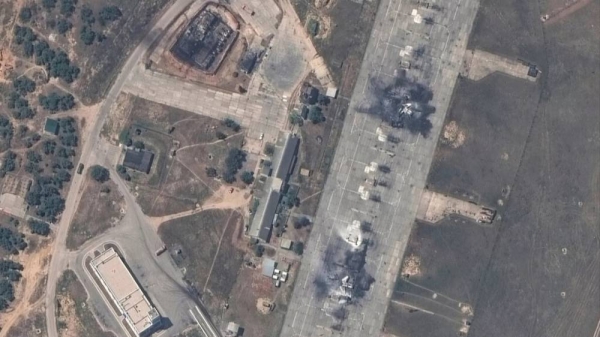
Senior figures in Iraq believe a brazen drone attack on the home of Iraq’s prime minister, Mustafa al-Kadhimi, marks an unprecedented escalation between the country’s leaders and Iran-backed militant groups attempting to overturn last month’s election.
The overnight attack is seen by Iraqi officials as an assassination attempt, and the first of its kind against a prime minister since the US-led invasion to remove Saddam Hussein nearly 19 years ago.
Kadhimi was slightly injured when a drone exploded near the front door of his residence in Baghdad’s fortified green zone. Seven of his guards sustained more significant injuries, although none were life-threatening.
Regional intelligence figures say the attack was likely launched by Iran-linked groups which lost two-thirds of their parliamentary seats in the national election and had on Friday tried to storm the green zone before being beaten back by security forces.
Whether the attack was ordered by Iran remains unclear. The political dominance in Baghdad between nationalist interests and blocs aligned to Iran is again being hotly contested in an increasingly unpredictable environment.
“We say the militias did this,” said one Iraqi official. “We say the Iranians maybe knew. We are not more sure than that.”
The absence of the Iranian general Qassem Suleimani, who exerted a powerful influence over Iran-linked militias until he was assassinated in a drone strike ordered by Donald Trump in January 2020, has however clouded even Iraqi officials’ understanding of whether acts by proxies in Iraq are ordered by figures in Iran.
“We assess that this would not have happened if Qassem Suleimani was still alive,” the official said. “There is no longer the same hold over the militia groups as there was under him. This means the link to the seat of power in Tehran is not as [strong] as it was.”
Iran-linked groups have, however, shown increasing vehemence after the election, which shredded their political muscle and bolstered the Iraqi cleric Muqtadr al-Sadr, who will play a prominent role in the months of horse-trading ahead to determine the makeup of a government and who gets to lead it.
Friday’s attempted incursion into the green zone led to the death of one protester and the wounding of several dozen members of the security force. In response, Qais al-Khazali, the leader of one of the militant groups, Asa’ib Ahl al-Haq, warned: “The blood of martyrs is to hold you accountable. The protesters only had one demand against fraud in elections. Responding [with live fire] means you are the first responsible for this fraud. […] Avenging the blood of the martyrs is our responsibility and we will do this by putting you on trial.”
The march on the fortified zone marked the second time this year that militia groups had attempted to make inroads into the seat of power. In June, leaders of the groups ordered their members to seize one of the main checkpoints leading across the Tigris. That move led to protracted negotiations with leaders of the groups and had weakened Kadhimi’s authority – so much so that he had seriously considered not standing for a second term.
However, a subsequent trip to Washington, where he successfully negotiated the withdrawal of remaining US forces from Iraq, was well received in Iran. “The Iranians want him to stand again,” a second Iraqi official said. “But that doesn’t mean that they wouldn’t have wanted this as well. It’s always complicated with them.”
One significant complication is the relatively weak hand of Suleimani’s replacement as leader of the Iranian Revolutionary Guard’s Quds Force, Ismail Ghani, who has had a rough induction to the role pioneered by his predecessor.
“They don’t listen to him as much as they listened to Qassem,” the first official said. “In fact sometimes they don’t listen to him at all. Nowadays there are many different lines back to Iran. That authority we had gotten used to has broken down.”
While Kadhimi has not announced whether he will stand for a second term, he is widely expected to do so by allies and adversaries alike. International observers have broadly dismissed claims of irregularities in the election, which attracted a poor turnout but delivered an emphatic boost for Sadr, whose support will be key if Kadhimi is to be returned.










